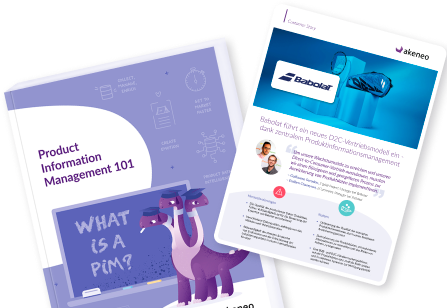Nov 27, 2023
4 min to read
Often the unsung hero of your eCommerce shop, your site search engine is a critical component for increasing revenue and customer satisfaction. Discover how integrating AI transforms this seemingly traditional tool into a powerhouse, cleansing data, enhancing localization, and personalizing the shopping experience.

The key to increasing your eCommerce revenue has been right in front of you the whole time.
The big trend in eCommerce and digital retail sales has been social selling and new marketplaces to adapt to. The endless influencers and hockers on TikTok, Instagram, Facebook, and of course Amazon is the new path to making exponential increases in profit.
That’s not without good reason. Those channels are certainly important, and making sure your product information shows up in these marketplaces correctly is a cornerstone of a great product experience.
But what if I told you that there was a way to increase revenue, satisfaction, and enhance the product experience, and it’s been sitting right in front of you this whole time?
Well let’s not bury the lead any further. What is it? It’s ole’ reliable.The thing we have been using since the beginning days of the internet. It’s our trusty pal, site search/product search engine.
Now, I know what you’re thinking: “You’re living back in 2005. Might as well start designing for flip phones, and SMS texting too.”
And to that I say, I miss my flip phone. Those were the good days.

Site search is not to be confused with shopping search engines such as Google Shopping, Bing Shopping, Yahoo Shopping, Wanelo, Shopzilla, or ShopMania. Those are search engines that provide their users with results pulled from crawling other sides. They are still important to optimize, but this blog is about site search.
Site search is an untapped resource in today’s modern product experience world, especially when you integrate that with AI, and further if you personalize the experience based on behavior. Before we get into the capabilities of AI-powered site search, lets see what a good site search/product search should be able to do:
Now that’s just the basics. Let’s bring up the capabilities to this year, add in some AI, and a pinch of analytics, bake it at 350 degrees for 10 mins, and voila! We have a delicious cheesecake. Sorry, it’s lunch time. I mean we have the recipe for increasing revenue in eCommerce.
So what exactly can AI do instead of just me cramming it in this blog as a buzzworthy keyword?
When a shopper comes to your site, they expect to be able to find all the information they need for any product with ease. But considering most organizations have at least thousands of SKUs across hundreds of categories, it’s very likely that some products may not receive the attention they deserve, resulting in incomplete or inaccurate information.
Here, AI steps in as a data magician, cleansing and enriching product data by seamlessly filling in these gaps by optimizing product descriptions, uses, and other tangible details. Take a global fashion retailer with an extensive inventory; AI-powered data enrichment ensures that each clothing item, regardless of its popularity, is equipped with detailed and accurate information. This means a customer searching for a specific type of fabric or design can find exactly what they need, contributing to a more satisfying shopping experience.
Second is a big one that gets missed a lot in terms of site search and product experience, and that is localization. Now to a lot of people that means purely just translation, but there’s a lot more nuance to ensuring your content is ready to be taken to different markets.
AI-powered translation tools excel at understanding the nuances of language, cultural context, and regional preferences. Unlike traditional translation services, which may focus solely on linguistic conversion, AI goes a step further by taking into account the cultural tone, idiomatic expressions, and contextual usage of language, and they have the capability to learn and adapt over time by analyzing user feedback and preferences. This ensures that the translated content resonates authentically with the target audience, fostering a deeper connection between businesses and their diverse customer base.
AI excels at processing vast amounts of data at remarkable speeds. This is particularly valuable in the e-commerce landscape, where customer interactions, preferences, and behaviors generate massive datasets. AI algorithms can quickly analyze this data, identifying patterns, trends, and correlations that might be impossible or time-consuming for human analysts to discern.
From these data sets of individual customer preferences, purchase history, and browsing behavior, AI algorithms can predict what products a customer is likely to be interested in, not only enhancing the shopping experience but also increasing the likelihood of upselling and cross-selling and providing the potential for dynamic pricing based on demand and availability.
Site search is often the unsung hero of eCommerce success, and when integrated with the capabilities of AI, can transform the modern product experience by enabling personalization, searchability, and localization at scale.
Beyond basic site functionality, good site search can build a sense of trust and loyalty with your consumer base, ensuring that shoppers have the information they need when they need it at every touchpoint through strong filtering capabilities, intelligent recommendations, clear and concise results, user-generated reviews, autocorrection, and an ever-helpful approach, even suggesting alternatives when an exact search doesn’t yield results.
So dust off your site search and get it acquainted with AI. It’s the key to higher conversion and revenue that’s been sitting right there this whole time.
If you want to learn more about harnessing AI technology to improve product experiences, you can check out our comprehensive AI for PX Strategy page, or reach out to a PX expert today.
Discover how to leverage AI technology to deliver comprehensive, compelling product experiences to consumers.

Sign up for our newsletter and stay ahead of the curve on everything you need to know about product information management, product experience management and how to unlock growth for your organization.
